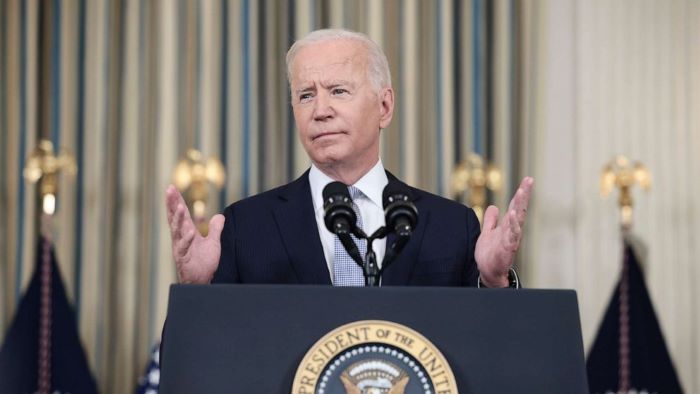The world's attention is fixed on the US Congress, deciding the fate of ongoing support for Ukraine. While most hope for continued or increased aid to help Kyiv counter the insatiable Russian dictator, some anticipate a potential blockage of funds by American lawmakers.
"Only two people will be smiling: one of them is Vladimir Putin in Russia, the other is Xi Jinping in Beijing. I don't know about you, but I don't want to give either of those two a Christmas present," UK Foreign Secretary David Cameron told the Aspen Security Forum.
Intense debates over Ukraine in the US might create the impression that Kyiv has lost its earlier American support. However, this is not true.
US military backing for Kyiv is unquestionably in America's interests. If Putin succeeds in capturing Ukraine, Washington will face significant challenges. In such a scenario, Americans may need to decide if they are willing to risk lives, perhaps for Estonia, a potential next target for Russia.
"We can't let Putin win. If Putin takes Ukraine, he won't stop there. If Putin attacks a NATO ally, and we've committed, as a NATO member, to defend every inch of NATO territory, then we'll have something that we don't seek, and that we don't have today - American troops fighting Russian troops," said US President Joe Biden.

What's hindering the right choice?
So, what's causing the disagreements and intentional delays in decisions clearly beneficial for Americans? Support for Ukraine seems to have become a pawn in domestic political maneuvering.
Since September 2023, Biden has urged Congress for an extra $24 billion in aid for Ukraine, but disagreements with Republicans thwarted this request. In late September, Congress passed a temporary budget that excluded aid to Ukraine, which Biden subsequently signed. Following this, the Biden administration made another attempt. The proposal, presented to the Senate, sought approval for a $110.5 billion allocation to support Ukraine, Israel, and Taiwan, with $61 billion specifically designated for Ukraine.
However, Republicans, recognizing the importance of ongoing military aid to Ukraine for the Biden administration, decided to use their votes to push through an issue crucial to them: addressing the urgent migration crisis at the US-Mexico border. Democrats are hesitant to include these measures, creating a point of contention.

Inside the Senate fray
Over the past few weeks, the US Senate has become the central platform for negotiating additional funding for Ukraine. Intense bargaining took place between Republicans and Democrats. In particular, one closed-door meeting in which Volodymyr Zelenskyy canceled his online speech erupted into a massive argument between senators and President Biden's administration representatives.
Ultimately, on 6 December, the vote failed when the issue was brought to the Senate floor again. Senators - including every single Republican - voted 51 to 49 against advancing the bill, with 60 votes needed.
The Democratic Party holds a 51-seat majority in the Senate, but Republicans took advantage of the filibuster tactic - an endless debate on the bill that requires at least 60 votes to end.
The vote throws into uncertainty the future of aid to Ukraine and sends lawmakers back to the negotiating table just days before Congress has scheduled its winter recess.
What's on the Republican wish list?
Republicans assert the need to strengthen control along the 3,145-kilometer US-Mexico border, as the number of asylum seekers has surged to record levels, overwhelming temporary facilities. Between September 2022 and September 2023, nearly 2.5 million people sought asylum at the southern border, with 260,000 coming in September 2023 alone.
Republicans aim to limit border crossings by making it harder to qualify for asylum and restricting the use of humanitarian parole. They argue that failure to limit migrant and drug flow undermines US security and sovereignty.
The Biden administration has proposed increasing border staffing, deportations, and legal pathways into the country. Biden even authorized some new border wall construction in Texas in October - a section of Trump's wall frozen due to its perceived ineffectiveness.
However, Republicans contend these amount to an "open border" policy that brings economic benefits and demographic changes but also poses challenges.
Partisan disagreement likely persists because research shows legalized immigrants tend to vote Democratic, not Republican. Thus, immigration policy has become politicized, with Republicans focused on heightened border security versus Democrats prioritizing humanitarian concerns.

"The Biden administration has done this intentionally. For what reason? Everybody asks me all the time. I think that ultimately they hope to turn all these illegals into voters for their side. It sounds sinister, but there's no other explanation for what's happening down there," said the US House of Representatives speaker, Republican Mike Johnson, in May 2023.

The Biden administration has already made concessions to Republicans, as the White House's proposed bill included nearly $14 billion to bolster border security. However, it seems Republicans are demanding a genuine review of current US immigration policy.
Clock for Ukraine aid is ticking
Time is running out for Congress to approve aid for Ukraine before the 14 December deadline when lawmakers go on winter recess. House Speaker Mike Johnson has indicated he does not plan to extend the House schedule.
Therefore, after that date, Congress cannot approve any additional funding. The White House will only have about $4.5 billion available from a Pentagon accounting error.

The lack of approved long-term funding negatively impacts military assistance for Ukraine and crucial macro-financial aid.
Since the US has been operating on a temporary budget since October, Ukraine has already missed over $3 billion in macro-financial assistance. Support for 2024, when Kyiv is counting on $10 billion, is also in question.
For now, whether a compromise can be reached on migration policy will determine Ukraine's prospects in its war against Russia as it enters 2024. We will see if such a compromise can be achieved in the coming days.
Read more:
- Putin declares goal to reshape global order, funds major military surge
- What's at stake if Ukraine loses?
- Biden: “Failure to support Ukraine is just absolutely crazy”





